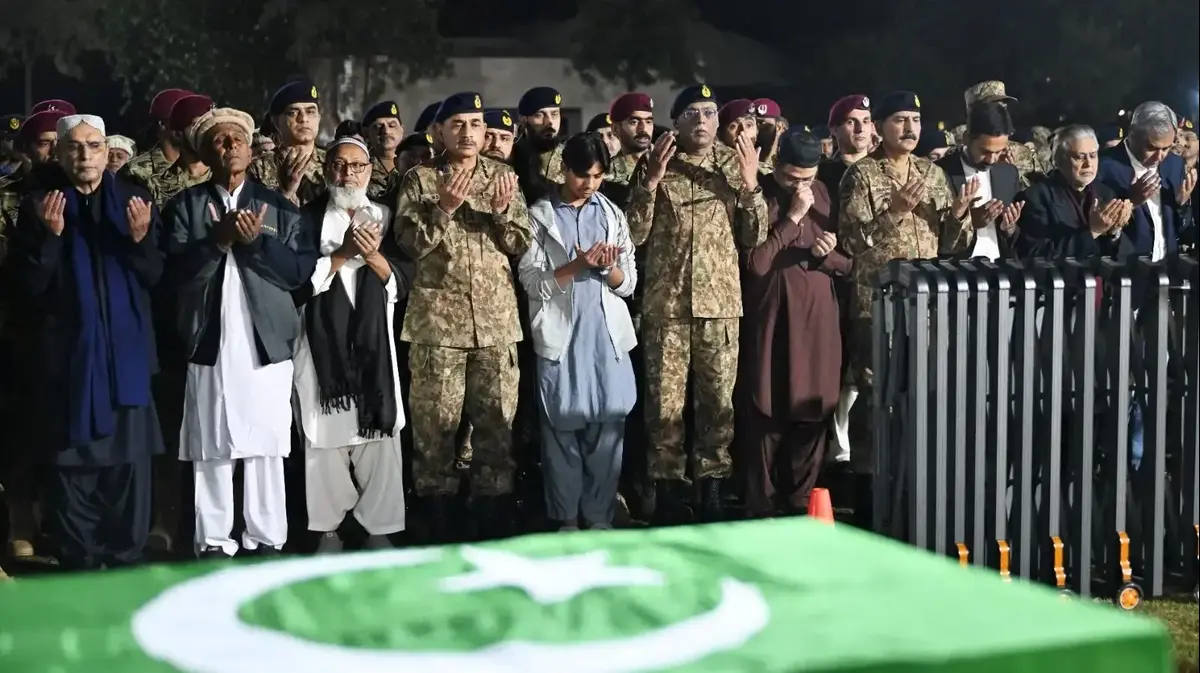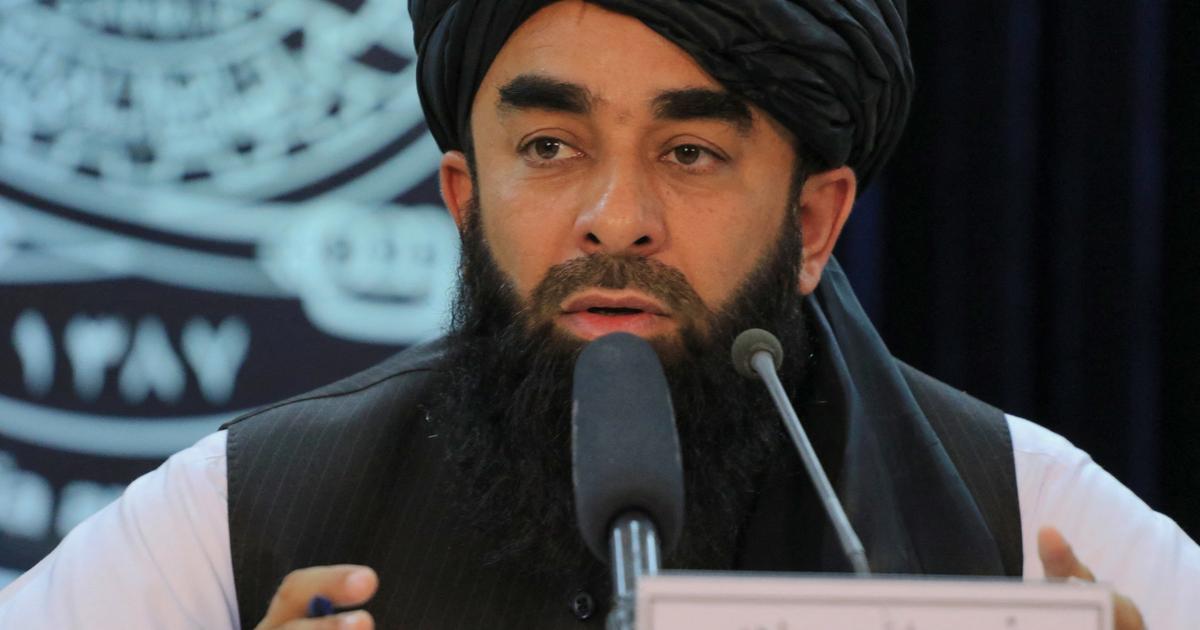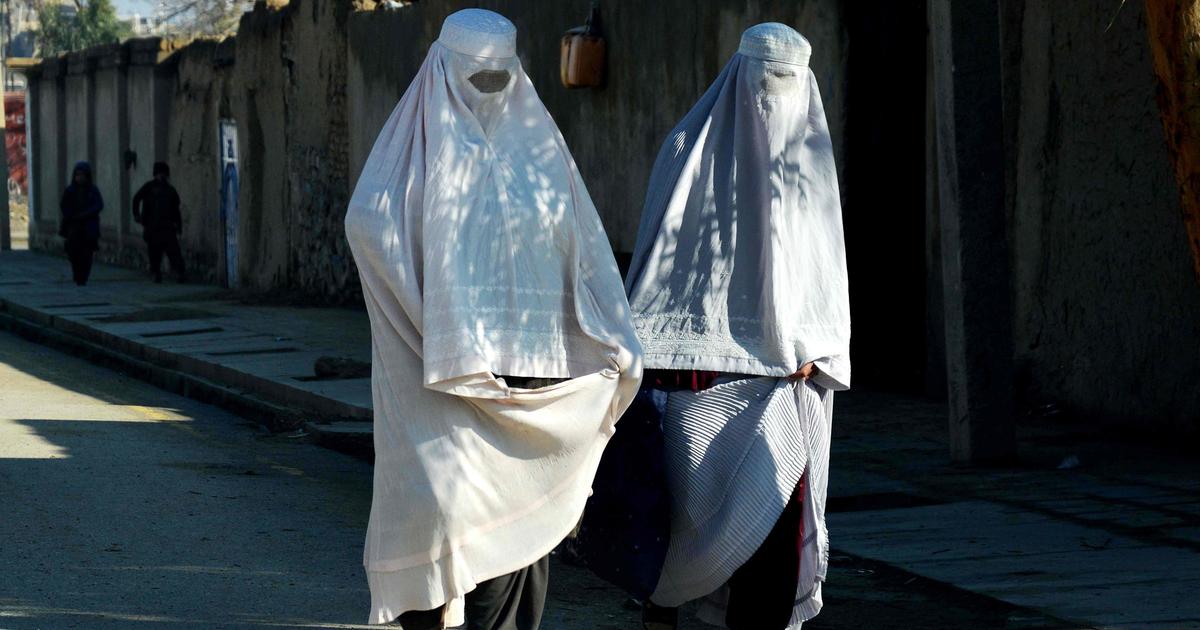Afghan Diary: Nobody talks about Corona in Afghanistan - the fight against starvation is raging
Created: 12/23/2021, 10:03 AM
Afghanistan is sliding deeper and deeper into a humanitarian catastrophe.
The plight of the people is unimaginable.
Correspondent Natalie Amiri describes a cruel reality firsthand.
Kabul - I would like to start this last chapter of the Afghan Diary with a letter, a young woman wrote it to me before I started my trip to Afghanistan:
Dear Natalie, you ask me how I am after the Taliban conquered my country. Only one thing comes to mind: that Afghanistan has lost everything at the moment. Afghanistan had order and a system, relations with other countries, that is to say international relations. Day in and day out, Afghanistan was evolving, but at the moment all is lost. There is nothing in my country at the moment: no freedom of speech, no democracy, no human rights, no respect, no life.
There is absolutely nothing left in Afghanistan at the moment. The economy is ruined. People's lives have become so difficult. No one has hope anymore. There is not a single piece of news that could raise hope in Afghans. I read a lot of the messages where I keep hearing that someone has committed suicide. The future is unclear. Everything is blurry and indistinct. Business life stands still, life stands still, people no longer laugh, nobody knows what will happen tomorrow. You don't even know what the next hour will look like.
This is the situation the people in Afghanistan are confronted with. We have to sacrifice everything. In far-flung villages they have an even darker life. But in the cities too, people have lost their jobs and thus their income. Salaries have not been paid for four months, and many no longer even have bread to eat. In the past you could support others, now we are all in a situation in which we can no longer help anyone. You are afraid to help and you think: "If I give someone the 5 afghanis I have, tomorrow I might starve myself". This is our everyday life now.
A friend of mine, who is the only daughter in the family and who supports the family financially - just like me - has sold all of her gold jewelry and used the proceeds to buy flour and bread. But what should she do next month? Almost all women have lost their jobs and are not allowed to continue with their training. Men were also deprived of many freedoms. In general, the people here no longer have any freedom. Our freedoms have been ruined. We have to live in hiding and not raise our voices. If we raise them, we risk our lives.
No one has the courage to talk about all these injustices and say out loud that all of these are unjust. Those in the new government are neither professionals nor experts. The responsibility in all offices and state organs is now left to people who have no idea of the tasks. Many say that there has been greater security on Afghan roads for a few days. What kind of security is that when people are not allowed to speak freely, walk around freely, leave the apartment freely?
Afghanistan in humanitarian crisis: direct international aid has been canceled since the Taliban came to power
I'm in Kabul, I'll meet my friend in a moment. The one who wrote me the letter. She can always, she tells me, she no longer has a job, her husband is at home too, he too has lost his job. After he was not paid for four months. After almost a week in Afghanistan, I have hardly met anyone who has had their salary paid out in the past few months. The country is sliding deeper into a humanitarian crisis every day. Most of Afghanistan's budget is funded from abroad. For decades.
Since the Taliban * took power in the summer, all direct aid from international donors has been cut. Washington also froze $ 9.5 billion, which is held as foreign exchange reserves of the Afghan central bank in the United States, and imposed severe financial sanctions on the country. International transfers via the SWIFT system are no longer possible. Aid projects, almost all of them, have been discontinued. Afghanistan is on the verge of bankruptcy. The country is in a massive liquidity crisis. The dollar price increases daily (due to the excessive demand for dollars), thereby the prices in the country. Afghans who have money in their accounts want to save their savings from inflation. Since the summer there has been a currency drop of 20 percent. I stand in front of a bank in Kabuldozens of people stand next to me, men. They are waiting to receive their investments, their own that are in their account.
In the seventh and final part of her Afghan Diary, the international correspondent Natalie Amiri reports on the great need that prevails in Afghanistan.
© N. Amiri / N.Bruckmann / M.
Litzka / afp
Before the summer there were still payments to the banks, from donors such as the UN, international embassies, etc. The money cycle worked.
But now there are no deposits, only withdrawals are required.
And bank deposits are shrinking day by day.
Compared to the previous year by 40 percent.
All Afghans who are standing with me in front of the bank want to withdraw money, they are afraid that there will soon be no more money at all.
Afghanistan is not an export country, there is hardly any production of its own, so the country is dependent on imports.
They have to be paid.
And there is no income.
Poverty in Afghanistan: Banks hardly spend any money - 23 million are at risk of starvation
I ask an older man what exactly is the problem, why they are all here.
He says that things are actually going better here than at other banks in Kabul, but then he is drowned out by the men standing around complaining about his testimony.
And tell me the opposite.
They have been standing here for days, getting no money, especially no dollars, and if they do, then only at an extremely bad exchange rate and then old banknotes are also given out.
more on the subject
Afghan Diary: Health system on the verge of collapse - patients "mostly go home sick"
Afghan Diary: On the once most dangerous road in Afghanistan - a symbol of failure
Afghan Diary: Afghanistan's defeated ghost army - "They wanted revenge, but there was no other plan"
If I had stood here yesterday, a man tells me, I would have seen that there were more people gathered in front of the bank, more than 200. They all wanted to withdraw their money.
Another tells me: I have 800,000 afghanis in my account, so far I have only been able to withdraw 200,000 afghanis and that I will get dollars for it, I can dream of that.
And for this withdrawal of 200,000 Afghanis, I sometimes wait here three days and nights before my turn.
And then he says, we stand here like beggars who have to beg for their own money.
200,000 Afghanis are the equivalent of almost $ 2,000.
Even before the Taliban came to power, the country was groaning under the worst drought in decades.
According to the UN, 97 percent of Afghanistan * will be living in poverty by the end of 2021.
23 million people are at risk of starvation, warn the United Nations.
Since the Taliban came to power: Poverty is growing - families in need sell babies themselves
So many numbers. Numbers that quickly fade in our minds if you don't see the suffering with your own eyes. Everywhere in Kabul there are children on the streets selling tea and sweets, trying to earn a little money. I meet families who haven't been able to buy anything to eat for days. Almost every family has to reduce their food intake. Bread and sugar, that's what we've been eating for weeks, says a woman who wants to remain anonymous. She is no longer allowed to work since the Taliban came to power. Her husband has also lost his job, he was employed by the Ministry of Health.
A friend tells me that until recently, poor people in Afghanistan would always stand in front of the bread shop, hoping that they would be given bread for free.
They were beggars, now there are teachers standing there too, looking down, ashamed, taking bread as alms.
It's a dilemma in which to move.
We have to consider what needs to be done to alleviate the plight of the people there.
But on the other hand, it must not be about recognizing the Taliban regime in any way.
The German MEP Dietmar Köster
Families who don't know what to do sell their young daughters as brides. They try to survive with the bridal money that the young girl's family receives for it. I tried to find a family, but the shame that they are selling their daughters is too great. Selling young girls as brides is not new in Afghanistan, it also has cultural motives, says suffragette Mahbouba Seraj in Kabul when I ask her about it.
What is new, however, is that they are now also selling their sons and a large number of young girls and boys are currently being sold.
This is a clear sign of increasing poverty.
And not only they are being sold.
In the Afghan news channels, on social media, more and more news is circulating about people selling their babies because of poverty, for 30,000, 40,000 Afghanis.
That's roughly half a year’s income.
EU sends 150 tons of aid to Afghanistan in December
“It's a tightrope act,” says Dietmar Köster, SPD member of the European Parliament and since 2019 in the Foreign Affairs Committee. “It is a dilemma in which one moves. We have to consider what needs to be done to alleviate the plight of the people there. But on the other hand, it must not be about recognizing the Taliban regime in any way. A third of the people have to fear death from starvation, because one cannot simply turn a blind eye to it. On the other hand, we have a regime in Afghanistan that is supported by terrorists; the Taliban are a terrorist organization with which there can be no official recognition. You have to walk a little on this tightrope walk, it is the result of a failed policy of the West towards Afghanistan. "
The EU sent 150 tons of aid to Afghanistan in December.
A drop in the ocean.
According to a UN report, the economic costs and social consequences would be colossal if the Afghan banking system collapsed.
The post-collapse phase would take forever to rebuild trust in the international market.
Therefore, at least part of the commercial banking system needs to be protected, the report said.
Who can still afford coal in Afghanistan?
The winters are bitterly cold in the country
We drive past a coal seller. I ask the driver to stop. I want to know who can still afford the coal here. I've heard and seen that in order to heat, everything is burned, plastic, fabric, everything that burns. You have to provide warmth, in Afghanistan it is bitterly cold in winter, I freeze here every day and I have warm shoes and a thick jacket. It is really freezing cold, it has sub-zero temperatures at night and winter has only just begun.
The coal seller is telling me that the price rose 30 percent compared to last year when an older man tried to buy two coal briquettes.
I ask him if the prices have gone up.
He affirmed that it had become more expensive and that he had no money, and that his son was killed in explosions.
When asked why the prices are so high, he answers as follows: “God and the government, nothing is under our control.” When I asked how he made the money for the coal, he said to me: Afghani earned and didn't even have breakfast. "
In his opinion, what does the future of Afghanistan look like with the change of government?
“God knows better, we don't know.
God knows better, ”he replies.
Bitter cold in Afghanistan: people are selling their belongings because they have nothing to eat
In Afghanistan, in winter, people often sit at a corsi, a very low, square table under which they heat with coal.
The embers give warmth all night.
But only very few can afford the coal.
Many put water in the sun in the afternoon so that it warms up a little.
This is then placed under the corsi so that the steam warms the people.
Nobody in Afghanistan talks about Corona, they don't have the time.
They don't have the luxury.
Because they have to make sure that their child does not die tomorrow.
Natalie Amiri, Afghan Diary
Often the heating is turned on in just one room, if there is one. Then the whole family gathers in that one room. We'll turn off the fridge, says a woman I visit at home. While we are sitting in one of the warm rooms, an electrical room heater, connected to the electricity, provides the warmth. Then there is a power cut, as is so often the case in Afghanistan. In winter even several times a day. Generators start for the few rich people, candles are taken out for the rest of the population. If it's already dark, you go to bed earlier.
Everywhere I see people on the roadsides selling saucepans, carpets and clothes.
Your belongings.
I ask the man standing by the roadside in front of pots, vacuum cleaners and hairdryers whether street sales have increased.
He says yes.
I want to know why.
His answer: "Poverty".
What do the people who sell say?
"They say they have nothing to eat, so they sell their items," the seller tells me.
Corona in Afghanistan?
Nobody in the country is talking about the pandemic - they don't have the luxury
The director of the US think tank Crisis Group wrote on Twitter: “The abrupt interruption of aid is having devastating consequences because the US and other donors, in their own interest, have eased Afghanistan's extraordinary aid dependency.
US sanctions that failed to stop the uprising as intended are now stifling the entire Afghan economy. "
Nobody in Afghanistan talks about Corona, they don't have the time.
They don't have the luxury.
Because they have to make sure that their child does not die tomorrow.
And that shouldn't sound melodramatic, that's the reality in December 2021 in Afghanistan.
(Natalie Amiri) * Merkur.de is an offer from IPPEN.MEDIA.
7 days in Afghanistan: Afghan Diary by Natalie Amiri
We are all still aware of the tragic images of the days around August 30, 2021 that accompanied the withdrawal of international troops from Afghanistan. Thousands of people desperately tried to get on one of the planes at Kabul airport to travel west. They did not want to live in an Afghanistan ruled by the Taliban again. Few of them were lucky enough to get a seat on board.
Since then, the Taliban have ruled the torn and impoverished country, which many observers are predicting a humanitarian catastrophe this winter.
Natalie Amiri, international correspondent, kept an impressive diary during her most recent research stay for her new book (to be published on March 14, 2022) in Afghanistan.
IPPEN.MEDIA publishes the diary of their trip in seven parts both online and in print in some titles such as Münchner Merkur or Frankfurter Rundschau.





/cloudfront-eu-central-1.images.arcpublishing.com/prisa/KA3LQ5ZEAFEQXOIZXJEEVDUZUQ.jpg)






/cloudfront-eu-central-1.images.arcpublishing.com/prisa/KMEYMJKESBAZBE4MRBAM4TGHIQ.jpg)


